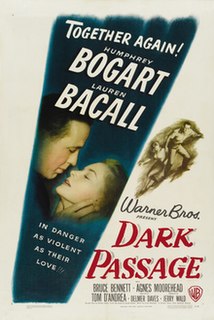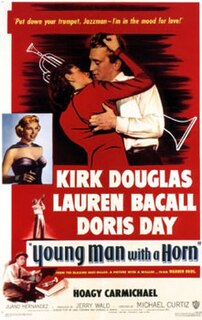
Humphrey DeForest Bogart, nicknamed Bogie, was an American film and stage actor. His performances in Classical Hollywood cinema films made him an American cultural icon. In 1999, the American Film Institute selected Bogart as the greatest male star of classic American cinema.

Patricia Neal was an American actress of stage and screen. A major star of the 1950s and 1960s, she was the recipient of an Academy Award, a Golden Globe Award, a Tony Award, and two British Academy Film Awards, and was nominated for three Primetime Emmy Awards. Her most popular film roles were: World War II widow Helen Benson in The Day the Earth Stood Still (1951), radio journalist Marcia Jeffries in A Face in the Crowd (1957), wealthy matron Emily Eustace Failenson in Breakfast at Tiffany's (1961), and the worn-out housekeeper Alma Brown in Hud (1963), for which she won the Academy Award for Best Actress. She featured as the matriarch in the television film The Homecoming: A Christmas Story (1971); her role as Olivia Walton was re-cast for the series it inspired, The Waltons.

Lauren Bacall was an American actress. She was named the 20th-greatest female star of classic Hollywood cinema by the American Film Institute and received an Academy Honorary Award from the Academy of Motion Picture Arts and Sciences in 2009 in recognition of her contribution to the Golden Age of motion pictures. She was known for her alluring, sultry presence and her distinctive, husky voice. Bacall was one of the last surviving major stars from the Golden Age of Hollywood cinema.

The Petrified Forest is a 1936 American film directed by Archie Mayo and based on Robert E. Sherwood's 1935 Broadway drama of the same name. The motion picture stars Leslie Howard, Bette Davis and Humphrey Bogart. The screenplay was written by Delmer Daves and Charles Kenyon, and adaptations were later performed on radio and television. The film is set in Petrified Forest National Park in Arizona.

The Big Sleep is a 1946 American film noir directed by Howard Hawks, the first film version of the 1939 novel of the same name by Raymond Chandler. The film stars Humphrey Bogart as private detective Philip Marlowe and Lauren Bacall as Vivian Rutledge in a story about the "process of a criminal investigation, not its results". William Faulkner, Leigh Brackett and Jules Furthman co-wrote the screenplay. In 1997, the U.S. Library of Congress deemed the film "culturally, historically, or aesthetically significant," and added it to the National Film Registry.

Dark Passage is a 1947 American mystery thriller film directed by Delmer Daves and starring Humphrey Bogart and Lauren Bacall. The film is based on the 1946 novel of the same title by David Goodis. It was the third of four films real-life couple Bacall and Bogart made together.
Foster Fitz-Simons was an American dancer, novelist, and teacher. He was a member of the first all-male dance company in the US, Ted Shawn's Male Dancers. He left Ted Shawn's company to form a partnership with Miriam Winslow; they performed together for many years, appearing with the Boston, Detroit, and Toronto Symphonies as well as at the Guild Theatre in New York City and at the Rainbow Room at Rockefeller Center. They toured South America for five months in 1941.

Bright Leaves is a 2003 United States/United Kingdom documentary film by independent filmmaker Ross McElwee about the association his family had with the tobacco industry. Bright Leaves had its world premiere at the 2003 Cannes Film Festival.

The Fountainhead is a 1949 American black-and-white drama film produced by Henry Blanke, directed by King Vidor, and starring Gary Cooper, Patricia Neal, Raymond Massey, Robert Douglas and Kent Smith. The film is based on the bestselling 1943 novel of the same name by Ayn Rand, who also wrote the screenplay adaptation. Although Rand's screenplay was used with minimal alterations, she later criticized the editing, production design and acting.

Young Man with a Horn is a 1950 American musical drama film directed by Michael Curtiz and starring Kirk Douglas, Lauren Bacall, Doris Day, Hoagy Carmichael, and Juano Hernandez. It was based on the 1938 novel of the same name by Dorothy Baker inspired by the life of Bix Beiderbecke, the jazz cornetist. The film was produced by Jerry Wald. The screenplay was written by Carl Foreman and Edmund H. North.

Woman of the Year is a musical with a book by Peter Stone and score by John Kander and Fred Ebb.

Confidential Agent is a 1945 American spy film starring Charles Boyer and Lauren Bacall which was a Warner Brothers production. The movie was directed by Herman Shumlin and produced by Robert Buckner with Jack L. Warner as executive producer. The screenplay was by Robert Buckner, based on the 1939 novel The Confidential Agent by Graham Greene. The music score was by Franz Waxman and the cinematography by James Wong Howe. The supporting cast includes George Coulouris and Peter Lorre.

Souls at Sea is a 1937 American adventure film directed by Henry Hathaway and starring Gary Cooper and George Raft. Based on a story by Ted Lesser, the film is about a first mate on a slave ship who frees the slaves on the ship after a mutiny overthrows the ship's captain. The title of this film was spoofed in the Laurel and Hardy comedy film Saps at Sea (1940). The supporting cast features Frances Dee, Harry Carey, Joseph Schildkraut, Robert Cummings, George Zucco, Tully Marshall, Monte Blue, and an uncredited Alan Ladd and Edward Van Sloan.

Designing Woman is a 1957 American Metrocolor romantic comedy film, in CinemaScope, about two young, whirlwind-romanced newlywed professionals and their misadventures in adjusting to each other's lifestyles. Vincente Minnelli directed the film, which stars Gregory Peck, Lauren Bacall, and Dolores Gray, and features Sam Levene and Chuck Connors. The film earned George Wells an Academy Award for Best Original Screenplay.

Proud Flesh is a 1925 American silent comedy-drama film directed by King Vidor and starring Eleanor Boardman, Pat O'Malley, and Harrison Ford in a romantic triangle.

Beauty for Sale is a 1933 American pre-Code film about the romantic entanglements of three beauty salon employees. Based on the 1933 novel Beauty by Faith Baldwin, it stars Madge Evans, Alice Brady, Otto Kruger and Una Merkel.
Bacall to Arms is a 1946 Warner Bros. Merrie Melodies series short planned by Bob Clampett and finished by Arthur Davis, in his second-to-last cartoon at Warner Bros. The short was released on August 3, 1946.

Operator 13 is a 1934 American pre-Code romance film directed by Richard Boleslawski and starring Marion Davies, Gary Cooper, and Jean Parker.

The Gift of Love is a 1958 American CinemaScope drama romance film directed by Jean Negulesco and starring Lauren Bacall and Robert Stack.

The Teaser is a 1925 American silent romantic comedy drama film written by Lewis Milestone, Edward T. Lowe Jr., and Jack Wagner based upon the play of the same name by Adelaide Matthews and Martha M. Stanley. The film was directed by William A. Seiter for Universal Pictures, and stars Laura La Plante, Pat O'Malley, Hedda Hopper, and Walter McGrail.


















